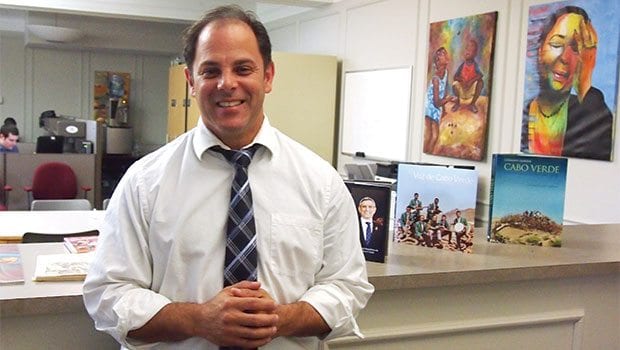Conference to bring together Cape Verdean activists, scholars
Bridgewater institute serves as hub for scholars throughout Cape Verdean diaspora

On April 20, scholars and activists will converge at Bridgewater State University for the two-day Annual Conference on Cape Verdean and Diaspora Studies, continuing a long tradition in which Massachusetts has served as a nexus for research on the global community centered around the West African archipelago.
At the center of that research is the Pedro Pires Institute for Cape Verdean Studies, a four-year-old think tank that is the only one in the world dedicated to the study of the nation and its diaspora.
“Our idea is to turn this institute into the hub of everything in the Cape Verdean diaspora,” says the institute’s director, Joao Rosa.
The conference, which kicks off at 9 a.m. on Friday, April 20, features seven panel discussions on transnational Cape Verdean communities — covering the similarities and differences between Cape Verdeans living in communities in Africa, Europe and the Americas — and other topics.
As with all of the institute’s endeavors, the forum will include both academics and lay people.
“We try to get a blend of community voices and folks in academia,” Rosa says.
In addition to hosting the annual conference, the institute publishes the Journal of Cape Verdean Studies, works on community projects and works collaboratively with scholars studying Cape Verde and its diaspora at other universities.
One recently-completed project undertaken by the institute is a documentary on Cape Verdean music that explores the origins and contemporary uses of Cape Verde’s traditional musical styles funana, coladeira, morna and batuka.
“We noticed that there isn’t a lot of material that can be used to teach about Cape Verdean music,” Rosa said. “People don’t have a sense of the different genres or the historical background of the music. Our aim was to create something that could be used in an academic setting.”
About Cape Verde
The Cape Verde islands, named for the cape on the coast of Senegal which is the nearest part of mainland Africa to the nation, were uninhabited when the Portuguese first settled them in the 15th century. They were soon populated with Africans, during the trans-Atlantic slave trade. Portugal retained political control over the islands until the African Party for the Independence of Guinea and Cape Verde won independence in 1975 after a years-long war that also involved the liberation of Angola and Mozambique.
The population of the nine-island archipelago reflects the blending of West Africans and the Portuguese, as does the creole language spoken there, which has a mostly Portuguese lexicon and West African grammatical structures.
Cape Verdeans first began immigrating to New England in the 1700s, due mainly to the whaling industry. Because the islands had major ports at which ships would replenish fresh water and pick up crew new members, they for centuries were central to transatlantic commerce.
In the late 1800s and early 1900s, large numbers of Cape Verdeans immigrated to New Bedford to participate in the textile industry and to surrounding South Coast communities to work in the cranberry harvests. While restrictive immigration laws passed in the 1920s limited the number of non-European immigrants for much of the 20th century, when those laws were rescinded in the 1960s, Cape Verdeans began immigrating to Boston, Brockton and other Massachusetts cities in large numbers.
The diaspora
While the numbers of people of Cape Verdean descent are difficult to ascertain — there’s no box for Cape Verdeans on the U.S. Census — most agree that there are more Cape Verdeans living abroad than the 450,000 who currently live on the islands.
The greatest concentration of Cape Verdeans in the diaspora is in Massachusetts and Rhode Island. In Massachusetts, there are large populations of Cape Verdeans in the Roxbury and Dorchester neighborhoods of Boston, in New Bedford and in Brockton, where as many as one-third of the 100,000 residents are thought to be of Cape Verdean descent, Rosa said.
While Cape Verdeans have been living in New England for generations, their culture remains strong. Rosa points to the annual Onset Cape Verdean festival in Wareham, a decades-old festival that draws second- and third-generation Cape Verdeans.
“When you look at second- and third-generation Cape Verdeans, they end up losing the language, but they retain words and keep up cultural ways,” Rosa said. “If you look at the families, the Cape Verdean culture is in the food they cook and in their vocabulary.”
Rosa, who was born on the Cape Verdean island of Santiago, immigrated with his parents to Brockton at the age of 12. He obtained a Ph.D. in education from University of Wisconsin and a master’s degree in applied linguistics from UMass Boston, working with Donaldo Macedo, one of the foremost scholars studying Cape Verdean language.
Rosa left a professorship at UMass Dartmouth to take the helm at the newly-formed institute in 2014.







